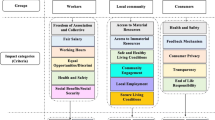Abstract
The role of organisations in efforts to address negative externalities on the natural environment has become urgent. As such, an organisation-focused perspective would be a limited view point of addressing global environmental impacts on the natural environment. We argue that by drawing on resource-based view theory, development of decision support systems (DSS) is an example of how organisational competences which are rooted in technology can be directed and used to not just create value but also enhance environmental sustainability. To this end, we present a decision support model which seeks to provide stakeholders with a better understanding of how to effectively conduct energy savings investment to promote energy conservation and sustainability within organisation. Bridging knowledge domains, the model presented integrates the key variables of economic and net environmental benefits to produce optimal decisions. These variables are used within an optimisation scheme that consists of integrated modules for data input, sensitivity analysis and takes into account the use of a set of energy saving options that satisfies a range of criteria (environmental, demand, cost and resource constraints); hierarchical course of action; and the evaluations of ‘best’ case scenario based on marginal abatement cost methods and Pareto optimisation. The steps involved in the system development are presented and its usefulness is evaluated using a case study application. The results of the application are analysed and presented, verifying the feasibility of the model whilst encouraging further improvements and extensions. The methodology developed provides stakeholders with an efficient and reliable decision process that is informed by both environmental and financial considerations.
Access this chapter
Tax calculation will be finalised at checkout
Purchases are for personal use only
Similar content being viewed by others
References
Acquaye AA, Duffy AP (2010) Input–output analysis of Irish construction sector greenhouse gas emissions. Build Environ 45(3):784–791
Anastas PT, Zimmerman JB (2007) Design through the 12 principles of green engineering. Eng Manage Rev IEEE 35(3):16–16
Aragon-Correa JA, Sharma S (2003) A contingent resource-based view of proactive corporate environmental strategy. Acad Manage Rev 28(1):71–88
BuildingRegulations (2006) Low or zero carbon energy sources: strategic guide
CarbonTrust (2009) Building the future, today: transforming the economic and carbon performance of the buildings we work in 2009
Cucchiella F, D’Adamo I (2012) Estimation of the energetic and environmental impacts of a roof-mounted building-integrated photovoltaic systems. Renew Sustain Energy Rev 16(7):5245–5259
Cucchiella F, D’Adamo I (2013) Issue on supply chain of renewable energy. Energy Convers Manage 76:774–780
Cucchiella F, D’Adamo I, Gastaldi M (2014) Financial analysis for investment and policy decisions in the renewable energy sector. Clean Technol Environ Policy
Cucchiella F, D׳Adamo I, Rosa P (2015) End-of-Life of used photovoltaic modules: a financial analysis. Renew Sustain Energy Rev 47:552–561
de Villiers C, Naiker V, van Staden CJ (2011) The effect of board characteristics on firm environmental performance. J Manage 2011:0149206311411506
DECC (2012) What are the factors influencing energy behaviours and decision-making in the non-domestic sector? A rapid evidence assessment. London
Doukas H, Nychtis C, Psarras J (2009) Assessing energy-saving measures in buildings through an intelligent decision support model. Build Environ 44(2):290–298
Goodall AH (2008) Why have the leading journals in management (and other social sciences) failed to respond to climate change? J Manage Inquiry 1–14
Gorgolewski M (1995) Optimising renovation strategies for energy conservation in housing. Build Environ 30(4):583–589
Ibn-Mohammed T et al (2013) Operational vs. embodied emissions in buildings—a review of current trends. Energy Build 66:232–245
Juan Y-K, Gao P, Wang J (2010) A hybrid decision support system for sustainable office building renovation and energy performance improvement. Energy Build 42(3):290–297
Koh SCL et al (2011) Supply chain environmental analysis (SCEnAT)-a new system for delivering a low carbon supply chain. http://www.lowcarbonfutures.org/. Published by Centre for Low Carbon Futures
Koh SL et al (2013) Decarbonising product supply chains: design and development of an integrated evidence-based decision support system—the supply chain environmental analysis tool (SCEnAT). Int J Prod Res 51(7):2092–2109
LondonRenewables (2004) Integrating renewable energy into new developments: toolkit for planners, developers and consultants. London
Ma Z et al (2012) Existing building retrofits: methodology and state-of-the-art. Energy Build 55:889–902
Mahoney JT, Pandian JR (1992) The resource-based view within the conversation of strategic management. Strateg Manage J 13(5):363–380
Phillips-Wren G et al (2009) An integrative evaluation framework for intelligent decision support systems. Eur J Oper Res 195(3):642–652
Porter M (1985) Competitive advantage: creating and sustaining superior performance (free press)
Reinaud J, Goldberg A (2012) The boardroom perspective: how does energy efficiency policy influence decision making in industry? OECD Publishing
RETScreen®International (2005) Clean energy project analysis: RETScreen® engineering & cases textboo
Russo MV, Fouts PA (1997) A resource-based perspective on corporate environmental performance and profitability. Acad Manage J 40(3):534–559
Ryghaug M, Sørensen KH (2009) How energy efficiency fails in the building industry. Energy Policy 37(3):984–991
Shi VG et al (2012) Natural resource based green supply chain management. Supply Chain Manage 17(1):54–67
Sivaprakasam R, Selladurai V, Sasikumar P (2014) Implementation of interpretive structural modelling methodology as a strategic decision making tool in a green supply chain context. Ann Oper Res 2014:1–26
Taylor S (2012) The ranking of negative-cost emissions reduction measures. Energy Policy 48:430–438
Toke D, Taylor S (2007) Demand reduction in the UK—with a focus on the non-domestic sector. Energy Policy 35(4):2131–2140
Winn MI, Pogutz S (2013) Business, ecosystems, and biodiversity: new horizons for management research. Organ Environ 1086026613490173:1–27
Author information
Authors and Affiliations
Corresponding author
Editor information
Editors and Affiliations
Rights and permissions
Copyright information
© 2015 Springer International Publishing Switzerland
About this chapter
Cite this chapter
Ibn-Mohammed, T., Koh, L., Acquaye, A., Taylor, S. (2015). A Robust Model to Enhance Organisation Boardrooms’ Decision-Making Process Towards a Low Carbon Economy. In: Cucchiella, F., Koh, L. (eds) Sustainable Future Energy Technology and Supply Chains. Green Energy and Technology. Springer, Cham. https://doi.org/10.1007/978-3-319-02696-1_1
Download citation
DOI: https://doi.org/10.1007/978-3-319-02696-1_1
Published:
Publisher Name: Springer, Cham
Print ISBN: 978-3-319-02695-4
Online ISBN: 978-3-319-02696-1
eBook Packages: EnergyEnergy (R0)




